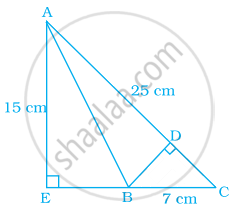Advertisements
Advertisements
प्रश्न
If the co-ordinates of the vertices of an equilateral triangle with sides of length ‘a’ are (x1, y1), (x2, y2), (x3, y3), then `|(x_1, y_1, 1),(x_2, y_2, 1),(x_3, y_3, 1)|^2 = (3"a"^4)/4`
उत्तर
The area of a triangle with vertices (x1, y1), (x2, y2) and (x3, y3) is given by
Δ = `1/2 |(x_1, y_1, 1),(x_2, y_2, 1),(x_3, y_3, 1)|`
Also, area of an equilateral triangle with side a is given by
Δ = `sqrt(3)/2 "a"^2`
∴ `1/2 |(x_1, y_1, 1),(x_2, y_2, 1),(x_3, y_3, 1)| = sqrt(3)/4 "a"^2`
Squaring both sides, we get
⇒ Δ2 = `1/4 |(x_1, y_1, 1),(x_2, y_2, 1),(x_3, y_3, 1)| = 3/16 "a"^4`
or `|(x_1, y_1, 1),(x_2, y_2, 1),(x_3, y_3, 1)|^2 = (3"a"^4)/4`
APPEARS IN
संबंधित प्रश्न
Prove that the area of a triangle with vertices (t, t −2), (t + 2, t + 2) and (t + 3, t) is independent of t.
The perimeter of a right triangle is 60 cm. Its hypotenuse is 25 cm. Find the area of the triangle.
If P(–5, –3), Q(–4, –6), R(2, –3) and S(1, 2) are the vertices of a quadrilateral PQRS, find its area.
Find the area of a triangle whose vertices are A(3, 2), B (11, 8) and C(8, 12).
In each of the following find the value of 'k', for which the points are collinear.
(8, 1), (k, -4), (2, -5)
Find the area of the triangle formed by joining the mid-points of the sides of the triangle whose vertices are (0, -1), (2, 1) and (0, 3). Find the ratio of this area to the area of the given triangle
Find the area of the quadrilaterals, the coordinates of whose vertices are
(−3, 2), (5, 4), (7, −6) and (−5, −4)
The four vertices of a quadrilateral are (1, 2), (−5, 6), (7, −4) and (k, −2) taken in order. If the area of the quadrilateral is zero, find the value of k.
The point A divides the join of P (−5, 1) and Q(3, 5) in the ratio k:1. Find the two values of k for which the area of ΔABC where B is (1, 5) and C(7, −2) is equal to 2 units.
If the coordinates of the mid-points of the sides of a triangle are (1, 1), (2, —3) and (3, 4), find the vertices of the triangle.
If the coordinates of the mid-points of the sides of a triangle are (3, 4) (4, 6) and (5, 7), find its vertices.
Find the area of ΔABC whose vertices are:
A(-5,7) , B (-4,-5) and C (4,5)
For what value of k(k>0) is the area of the triangle with vertices (-2, 5), (k, -4) and (2k+1, 10) equal to 53 square units?
Show that the following points are collinear:
(i) A(2,-2), B(-3, 8) and C(-1, 4)
Find the value of y for which the points A(-3, 9), B(2,y) and C(4,-5) are collinear.
For what values of k are the points A(8, 1) B(3, -2k) and C(k, -5) collinear.
If the points P(-3, 9), Q(a, b) and R(4, -5) are collinear and a+b=1, find the value of a and b.
Find the value of x for which the points (x, −1), (2, 1) and (4, 5) are collinear ?
In ∆PQR, PR = 8 cm, QR = 4 cm and PL = 5 cm. 
Find:
(i) the area of the ∆PQR
(ii) QM.
The table given below contains some measures of the right angled triangle. Find the unknown values.
| Base | Height | Area |
| ? | 12 m | 24 sq.m |
Let ∆ = `|("A"x, x^2, 1),("B"y, y^2, 1),("C"z, z^2, 1)|`and ∆1 = `|("A", "B", "C"),(x, y, z),(zy, zx, xy)|`, then ______.
The value of the determinant `abs((1,"x","x"^3),(1,"y","y"^3),(1,"z","z"^3))` is ____________.
If the points (2, -3), (k, -1), and (0, 4) are collinear, then find the value of 4k.
Points A(3, 1), B(12, –2) and C(0, 2) cannot be the vertices of a triangle.
The points A(2, 9), B(a, 5) and C(5, 5) are the vertices of a triangle ABC right angled at B. Find the values of a and hence the area of ∆ABC.
Find the missing value:
| Base | Height | Area of parallelogram |
| ______ | 8.4 cm | 48.72 cm2 |
In the given figure, if PR = 12 cm, QR = 6 cm and PL = 8 cm, then QM is ______.

In the given figure, triangle AEC is right-angled at E, B is a point on EC, BD is the altitude of triangle ABC, AC = 25 cm, BC = 7 cm and AE = 15 cm. Find the area of triangle ABC and the length of DB.

